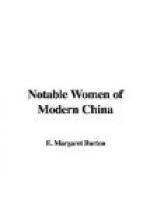During her first year of work she had four Bible women associated with her who went out with her daily, conducting meetings for women in the two chapels which were under her direction, visiting in the homes, or talking to patients in the dispensary waiting room. One of her early letters reads: “I felt that these Bible women needed special hours for prayer and Bible study, in order to give out the Bread of Life to others. So arrangements were made to have at least two hours of study every Monday morning, and we have prayer together before planning to carry out the Lord’s will in the week’s work.”
In addition to this work she was given oversight of the two day schools for girls in Kiukiang. Of them she reported: “The teachers are trying to do their best, but many times I have wished that we could secure better educated women and have our day school standard advanced. The girls who can afford to go to school don’t care to study the old Chinese books which these women are prepared to teach, so the better classes are not being touched by the Christian teachers. Those who have nothing special for the girls to do let them go to while away the time; then when tea picking time comes they leave the school. All can see that such work cannot be of any great value.”
Conditions of this sort were discouraging indeed, but she met the situation with characteristic courage, and added to her other duties the task of teaching a little music and English in these schools. The introduction of these subjects proved to be very successful in reviving the pupils’ flagging interest. “The girls are more interested just now,” a letter says, “because they have once a week a lesson in singing; formerly it was given on Saturday in our home, but experience soon taught me that this was an impossibility on account of the continuous callers and disturbances. I go now to each school once a week and teach them there. They also have a lesson in English during the week. It seems so strange to me that all people, old and young, male and female, are seeking a knowledge of English.”
She was quick to see, however, that the only permanently successful solution of the day school problem was in well-trained teachers. Her great desire was for “the day when day school teachers should be better qualified for their work, that they might draw pupils to school by their own knowledge.” In the meantime she did all she could to add to the efficiency of the teachers she had. One of her letters tells of her efforts to help one of her discouraged assistants: “One of the teachers is very anxious and feels that she cannot teach the school. She spoke to me several times of her inability to keep the pupils’ attention because of her own lack of knowledge. As we have no trained teachers to take her place I cannot spare her. Though she has not a good head she has a good Christian heart, so for the good of the school I have to keep her and give her a few lessons each week. It is doing her good and helping her to teach better.”




